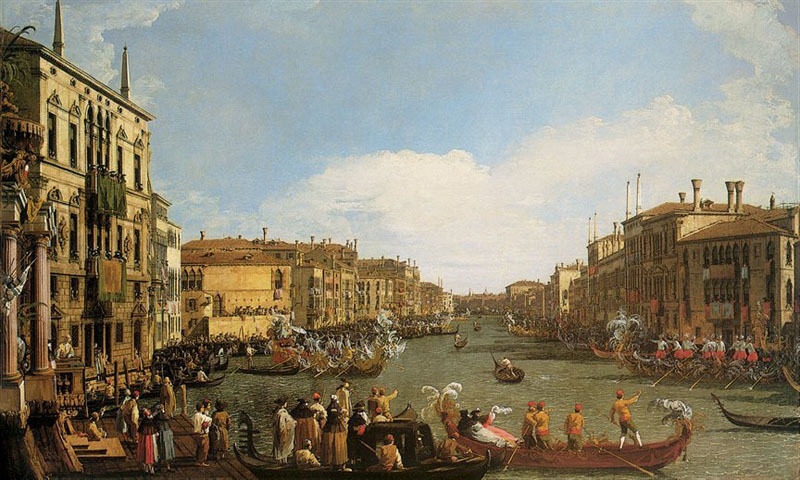15. A Regatta on the Grand Canal, c. 1733-1734.
Oil on canvas, 77.2 x 125.7 cm.
The Royal Collection, London.
The Nobility
These patricians, however, jealously guarded the secret to their nobility, the oldest in all of Europe. Certain families could still boastfully count among their ancestors those who had elected the first doge in the seventh century. One of his successors, Gradenigo, attained a truly revolutionary success for the aristocracy by abolishing, in 1297, the custom of annually renewing the Grand Council. He then declared as irremovable all those who had been a part of the Council for four years and granted the male descendents the right to sit in the same role as their fathers. This was the origin of the famous libro d’oro,[4] in which the names of permanently noble families appeared. Failure to register meant the forfeit of nobility. Plebeians and foreigners could likewise be registered after they proved, through their actions, their allegiance to the State. Following the Chioggia War (1378-1381), thirty families in the nation were given noble status in this way. The registry was then reopened in 1775 to remedy the impoverishment of an entire caste, adding commoners who had the most assets.
However, this oligarchy was rather mismanaged by the government, whose behaviour caused fewer problems for the general population. The doge himself was closely watched. The example of his predecessors, many of whom had died a violent death, and the tragic stories about the Foscaris and the Marino Falieros, even more so than the shape of the corno ducal, which was quite similar to a Phyrgian cap, reminded him that he was nothing more than the Republic’s first subject. Always fearful of conspiracies, the government intervened in the private affairs of the nobles, prohibiting any involvement with representatives of foreign powers. This way it could prevent large fortunes from accumulating within the same household. Was not a patrician executed for having done nothing more than going on a mission without telling anyone about it? Was not one of the Pisanis, in the middle of the eighteenth century, who had inherited 150,000 ducats, forced to give up the man she had chosen for marriage because he was too wealthy and to give her hand to a suitor with no fortune? Likewise, the patricians, who were forever being thwarted by sumptuary laws, were not permitted to wear, except on holidays and carnival days, any gems or colourful outfits after their novitiate, that is to say, after the first two years of their marriage.
Noble pride, and an awareness of its vitality, which had made the nation so powerful during the “grand age”, no longer survived. Mores, as they weakened, became imbued with sentimentality and people delighted in taking part in petty intrigues or issues of etiquette. To use only the third person was considered polite and the art of bowing was very complicated: one had to make them very low even though one might not be aware of whether or not “a good half foot of one’s wig was dragging on the ground”. And what’s more, lords had been seen punishing passers-by who had not shown them enough respect by pushing them into the lagoons. The most humble way of submitting a request was to go to Broglio, where high-ranking citizens gathered every day, and kiss the sleeve of one’s protector. Whenever a patrician was promoted, there were never-ending compliments and congratulations that seemed almost comical. Charles de Brosses, witnessing the election of a general for the galleys, was amused by the prostrations of the new official and the maternal kisses lavished upon him as he exited the Grand Council: “They rang the bell so that they could be heard in the middle of the square”. The practices of courtesy at this time were truly exquisite, even on the part of the courtesans, and the general character had become quite peaceable. De Brosses affirmed that “Venetian blood is so sweet that, despite the ease given by masks, the allures of the night, the narrow streets and especially the bridges without guard rails, from which one can push an unsuspecting man into the sea without worry, there are less than four such accidents each year, even those arrive only amongst foreigners”.
